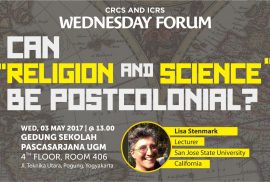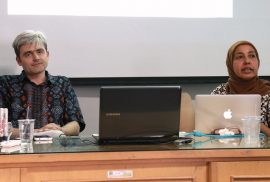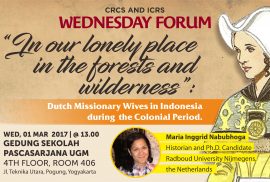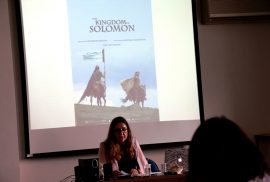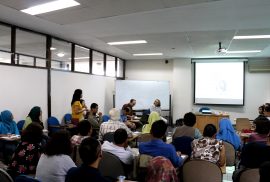
Abstract
In the late-15th to mid-16th century, Europe experienced three revolutions: a geographical revolution (“voyages of discovery” and colonial expansion); a religious revolution (the Protestant Reformation) and a Scientific Revolution. Within the religion and science discourse, the relationship between two of these revolutions—the Protestant Reformation and the Scientific Revolution—has been much studied, while the third revolution has been ignored. As a result, the ghosts of colonialism still haunt us. This presentation will explore the ways considerations of the third revolution—and postcolonial perspectives—broaden out understanding and expand the discourse, with special attention to the contributions of postcolonial Science Fictions.
Speaker
Lisa Stenmark is author of Religion, Science and Democracy: A Disputational Friendship, and co-editor (with Whitney Bauman) of Religion, Science and Queer Theory, part of a series Religion and Science as a Critical Discourse. She teaches at San Jose University and, in her spare time, she practices Aikido (in which she has a Black Belt) and other martial arts, trains triathlons and is an avid Science Fiction fan.
Look at the full poster of the event here.
Wednesday Forum
Anang G Alfian | CRCS | Wednesday Forum Report

As a product of the globalized world, social media have created a virtual space of communication and interaction. Many people use it with enthusiasm as it helps humans build communication and connectivity much faster than ever before. On the other hand, many consider this phenomenon a challenge for living ethically and productively.
Dealing with this topic, Wednesday Forum on February 9th 2017 held a discussion on “wefies” (group self-portraits posted on social media) in relation to the Islamic concept of riya’ (showing off piety). The two speakers, Fatimah Husein, currently teaching at CRCS/ICRS as well as UIN Sunan Kalijaga, and Martin Slama of the Institute for Social Anthropology at the Austrian Academy of Sciences, presented the emerging phenomenon of online piety in Indonesia, especially on how Muslims rethink riya’ in today’s popular “wefie” culture. The presentation was based on Husein’s article titled “The Revival of Riya’: Displaying Muslim Piety Online in Indonesia” which has been submitted for a virtual issue of American Ethnologist and Slama’s research project on “Islamic (Inter)Faces of the Internet: Emerging Socialities and Forms of Piety in Indonesia” funded by the Austrian Science Fund.

Abstract
Until 1935, the Dutch Protestant mission (zending) in Indonesia was officially run by male missionaries. Women were considered to be supplementary rather than essential actors. Despite the fact that there is only limited information available about them, women were involved in the Dutch Protestant mission from the early nineteenth century. This talk presents a study about the experience and role of Dutch women in the Protestant mission, with particular reference to the existing letters written between 1855 and 1931 by four missionary wives who lived in Sulawesi and North Sumatra. The letters of the four women reveal their domestic and social activities, as well as their perceptions of their role in the mission and the society in which they lived. This talk explores gendered notions in missionary practices and points out the lack of attention to the study of women in Christian missions within the broader framework of Indonesian colonial history.
Speaker
Maria Ingrid Nabubhoga is now a Ph.D. candidate at the Faculty of Philosophy, Theology and Religious Studies at Radboud University Nijmegen, the Netherlands, in the project ‘Indonesia Mirrors’, jointly organized by Radboud University Nijmegen, The Nijmegen Institute for Mission Studies Radboud University and Duta Wacana Christian University (UKDW). Her Ph.D. project explores the perception of contemporary Indonesian immigrants on religion and modernity in the Netherlands, in continuity with the Dutch colonial past in Indonesia.
Meta Ose Ginting | CRCS | WedForum Report

Going to the cinema is a new social practice in modern society. To some extent it can also be perceived as a spiritual practice. Dr Nacim Pak-Shiraz, the Head of Persian Studies and a Senior Lecturer in Persian and Film Studies at the University of Edinburgh and guest speaker at the Wednesday Forum on February 9th, studies this paradox in the dynamics of Iranian cinema. She began by noting that there has been only a little academic attention to the movies based on Quranic epics, in contrast to what has happened with Biblical epics from Hollywood.
Meta Ose Ginting | CRCS | WedForum Report

Jonathan Zilberg, a cultural anthropologist whose research and advocacy focuses on museum ethnography, argued that Indonesian museums face such problems as performance, transparency and accountability, but they have the potential power to promote pluralism to the public. In his February 1st Wednesday forum presentation, he raised questions as to how Indonesian museums can be a strong bond to serve Indonesia’s diversity.
Based on his research in National Museum of Indonesia in Central Jakarta, Zilberg argued that museums are an extension of culture and identity. He conducted his research by closely examining the activities of visitors of National Museum. He took photos from different angles and then reflected on how visitors interact with the objects on display. He stressed that a museum that functions well should be a place to learn and display democracy. Different people come to the museum with various interests. These differences can lead them to learn about pluralism in comfortable ways.
Meta Ose Ginting | CRCS | Wednesday Forum Report

Akhmad Akbar Susamto, active lecturer in in the Graduate School of Universitas Gadjah Mada (UGM) started his presentation in Wednesday Forum about Islamic and Western economics by explaining the background behind the academic discipline of Islamic economics. Islamic economics has been developed based on a belief that Islam’s worldview differs from that of Western capitalism. Islamic economics has its own perspectives and values related to how decisions are made. According to Susanto, the boundaries of Islamic economics as a social science or a discipline are closer to economics than to theology or to fiqh.
There is a strong impression telling that Islamic economics is in complete opposition with the Western conventional economics. Susanto argued that such an impression is wrong: although the Islamic worldview does differ from the worldview of Western capitalism, Islamic economics as an academic discipline was established to realize the Islamic worldview and can stand together with conventional economics established in the West. Each can benefit from the other.
Susanto introduced a new framework for Islamic economic analysis that lays a foundation for the complementarity between Islamic and conventional or Western economics. This new framework can resolve the dilemma faced by Muslim economists and help to establish Islamic academic disciplines alongside their Western peers.
This new framework introduced by UGM economists to define the scope and methodology of Islamic economics. It is called the Bulak Sumur framework. The name is taken from the name of the place where UGM is located. Based on the framework, an economy can be considered Islamic as long as it constitutes visions and methods which are consistent with Islamic worldview and it is able to help and guide societies to transform their economy towards the achievement of welfare as Islamic worldview dictates. To be Islamic requires not only separating the sacred and profane but being able to depict both the current state and the ideal state. Thus, the Bulaksumur Framework includes:

